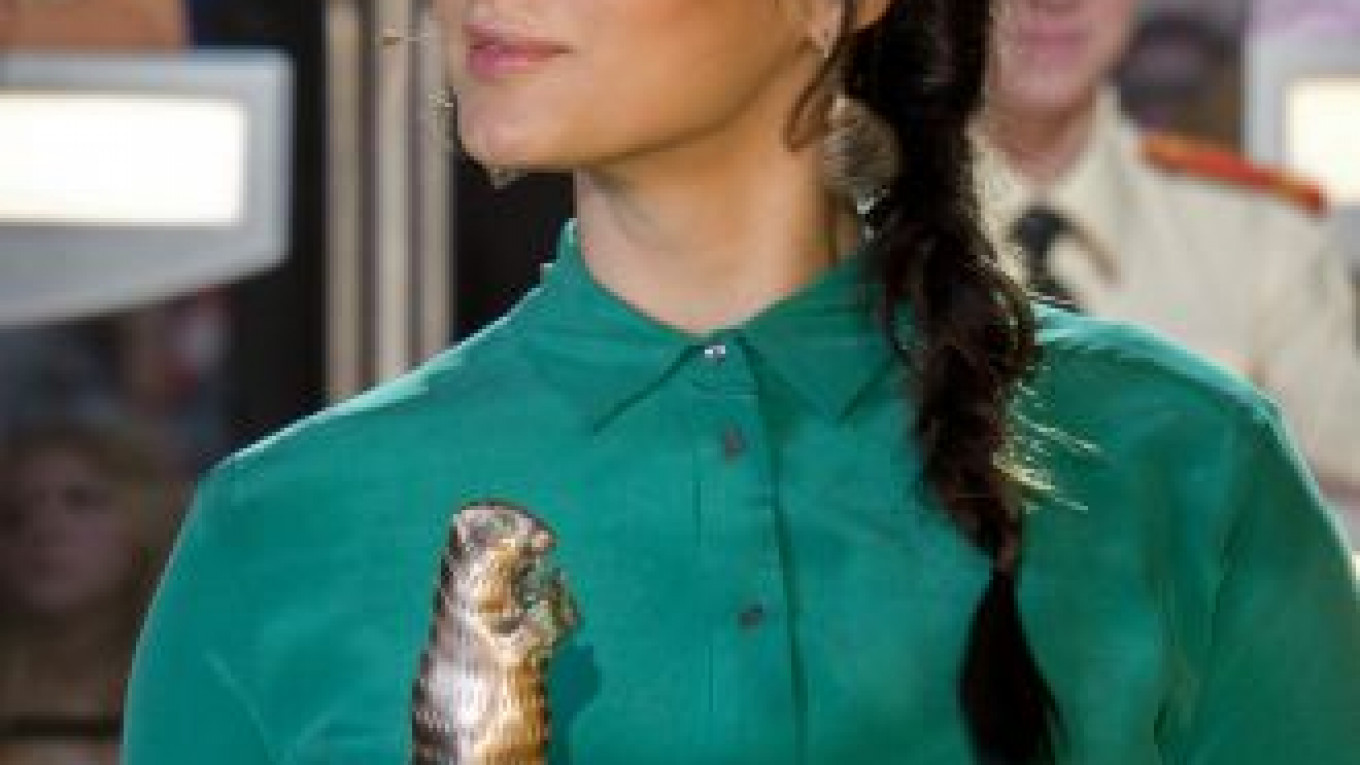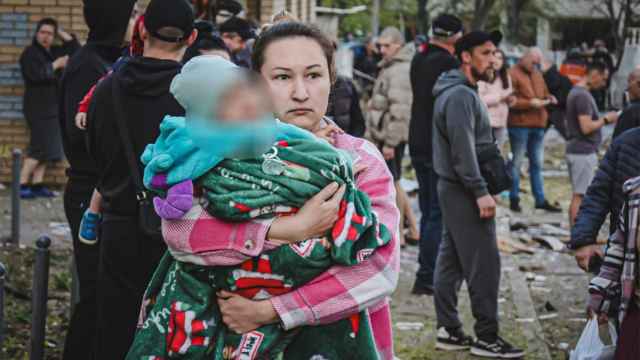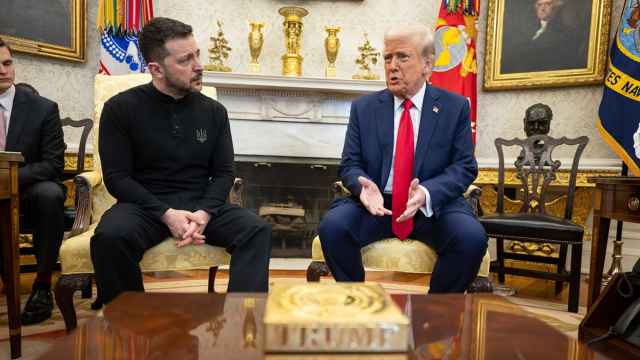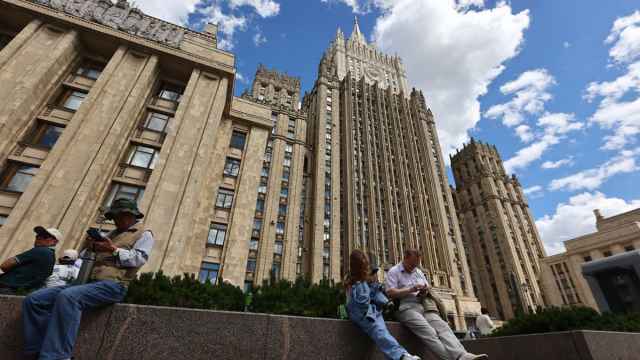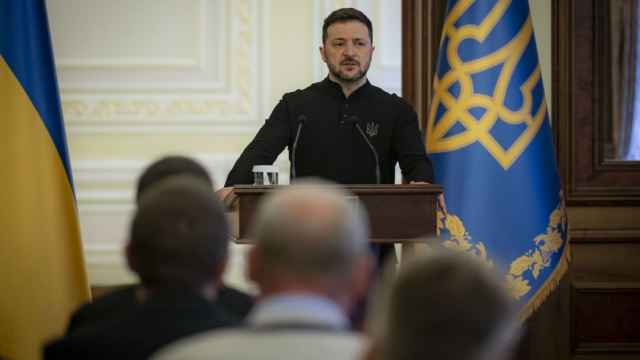During his marathon televised question-and-answer session last year, then-Prime Minister Vladimir Putin was asked whether he intended to make media celebrity Tina Kandelaki education minister.
To laughter in the studio and with a grin on his own face, Putin replied that, while Kandelaki was an “interesting and colorful woman” whose talents were so numerous that even he didn’t know the full extent of them, she was not experienced enough for such a job.
Although the education system is a pet project of the Georgian-born television presenter who rose to fame in Russia with shows such as “I Know Everything” and “Wedding Flurry,” Kandelaki said that she would never actually want such an appointment.
Education:
1993 — Tbilisi Medical Institute (degree not completed)
1994 — Tbilisi Faculty of Journalism (degree not completed)
2005 — Russian State University for Humanities
Work Experience:
1994 — Georgian radio station Radio 105
1995 — DJ on “M Radio” and shows on the Radio for Adults and Silver Rain radio stations
2002 — Presenter of “Details” on CTC Television
2003 — Presenter of “The Smartest” on Channel One
2006 — Presenter of “U-Turn” and “Special Opinion” on Ekho Moskvy radio station
2007 — Presenter of “Wedding Fuss” on CTC Television
2008 — Co-founded Apostol, a PR, production and marketing company
2009 — Appointed to the Public Chamber
2010 — Presented “Unreal Politics” on NTV
2011 — Set up the educational resource “Smart School” (умная-школа.рф)
Favorite authors: John Updike, Henry Miller, Tom Wolfe, Lyudmila Ulitskaya
Reading now: “Germany is Doing Away With Herself” by Thilo Sarrazin
Favorite TV series: Entourage (HBO, 2004-2011)
Favorite restaurant: Tinatin, 58 Ulitsa Plyushchikha, Bldg. 1A, Moscow
Weekend getaway: Moscow region or Tbilisi or anywhere with my children
Outspoken and scandal-prone, prize-winning Kandelaki, 36, has re-modeled herself in recent years as a businesswoman, social media guru and political commentator.
She has put herself in the firing line of the white-ribbon-wearing opposition by openly proclaiming her support for United Russia and Putin — but she freely comments on failings of the system and has her own diagnosis of where the authorities have gone wrong in recent months.
“Putin could be shown 100 times better [on television],” she told The Moscow Times in a recent interview, “more interestingly, with more content and more sexually.”
Having made Russia her professional and political home, Kandelaki doesn’t hide her disdain for the president of her native country, Mikheil Saakashvili, whose amorous advances she claims she was once forced to spurn.
Her energy and loquaciousness have made her enemies as well as friends. Often compared to fellow television personality Ksenia Sobchak — with whom she used to co-host “Two Stars” on Channel One and once kissed in a style inspired by Madonna and Britney Spears — the two have now fallen out. Sobchak has described Kandelaki as the “Kremlin’s Trojan horse.”
For her part, Kandelaki joked that the opposition-friendly Sobchak and fellow protest leader Ilya Yashin, with whom Sobchak has been romantically linked, “will become the Russian Bill and Hillary Clinton.”
Unlike Sobchak, however, Kandelaki said she does not have close links to Putin. But she has been connected to other influential figures: from oligarch Suleiman Kerimov, in whose passenger seat she was sitting when he wrapped his Ferrari around a tree in Nice in 2006, to Oleg Kashin, with whom she spent the evening the day before the Kommersant journalist was almost killed in a violent assault in 2010 by unknown assailants.
But she also devotes time to her media company, Apostol, which she co-founded in 2008. Moreover, Kandelaki was made a member of the Pubic Chamber by President Dmitry Medvedev in 2009 and runs her eponymous Georgian restaurant in Moscow, Tinatin. She said that she plans to launch an Internet television channel within a couple of years.
Kandelaki claims that she is the most-followed Russian across all social networks, and her output is prolific. On Twitter she is the most popular Russian after Medvedev. “I have a big audience,” she said, “much bigger than [opposition leader] Alexei Navalny.”
In an interview that has been edited for length and clarity, Kandelaki spoke about why Putin isn’t stylish enough, the opposition in Russia and in Georgia, her social media power and how her car accident with Kerimov — of which she is constantly reminded by the burns on her hand and thigh over which she has tattooed Mayan symbols — spurred her into business.
Q: What does Russia lack?
A: There's no Russian style. Soviet style was a classic. Stalin invested a lot of money in the creation of this Soviet style, and he understood very well that the Soviet Union needed a style. When the Soviet Union fell, its style lost its relevance.
Putin is in his third term, but there's no Putin style. It could be done. A lot of people, including Western architects, would come and build it. If this style appears, it will firstly be a step on behalf of the authorities to engage in dialogue and, secondly, an answer to the question that was formulated during the protests on Bolotnaya and Sakharova.
Q: Under what circumstances would you regret your decision to vote for United Russia and Putin?
A: If I see that the country has stopped developing, if I see real stagnation, if I see that Putin remains only in order to keep power, if I see that he doesn't have a conceptual vision for the development of the country, if I understand that the whole point of his maintaining power is to provide a guarantee of his own safety — then I will be disappointed.
But I don't see any of that today. It's not aggressive politics that he practices, but it's the politics of a strong player. It's very hard to pressure him. He's been in politics for a long time, and he's very confident of himself. Everybody says he keeps his word. Putin likely returned to power for one of two reasons: either he has some sort of mission, or he does not know to whom he can hand over power.
I don't want to excuse or to blame Putin — I don't know him well, and I have only seen him once from far away. I didn't grow up in St. Petersburg, I don't know his circle. But he doesn't always explain his motives. Society has changed so much, in how information is spread, that it's essential for him to explain himself. If he had started to explain himself much earlier, then maybe Bolotnaya and Sakharova would not have happened.
I can't be dissatisfied because it was under Putin that I was able to achieve things that I couldn't even have dreamed about 15 years ago.
Q: What has changed since the Duma elections on Dec. 4?
A: Even at the very beginning, the disagreement was not with the authorities themselves but the style of the authorities — the interface of power. People are already living in a different information space. Government ministers are using one platform and people another. Either you have to make your platform more interesting so that people come back to you, or you have to go to their platform and play by their rules.
The authorities are playing by old rules. Information is released downward, and it is assumed that people absorb the information and believe in it. I don't know who in Putin's circle thinks that everything works like it always has, but if I had the chance to talk with Putin, I would tell him that people receive their information from a variety of sources.
Even if television says there were no protests, nobody believes this. It is this direct deception that angered people most of all. Why lie to people when the Internet is burning with the news that United Russia didn't get the expected result during parliamentary elections? It should have been admitted. In terms of information, the authorities lost to the opposition.
But in its essence, power is the same everywhere, including in democratic countries. There are more powerful clans and less powerful clans. People talk about Putin beginning his third presidential term, but let’s count how many terms have been served by the Bush family!
Q: Some prominent people, most notably your fellow television presenter Ksenia Sobchak, seem to have been radicalized by the opposition movement. Why haven’t you?
A: I have spoken to Navalny and many other opposition figures. They want to unite people around an anti-Putin idea. But it's not an idea, it's not a plan. Navalny does not have a fully thought-through position, he often can't reference facts, and his rhetoric is flawed.
As the head of a company, I understand that there may be employees who are unhappy with the management of the company and who think that if they ran the company it would be better. But a “I am from the middle management, and I have a brilliant idea, let’s develop the company according to my plan” approach is lacking. Just like the Russian opposition.
If people like Navalny come to power, I am not sure that it would go well for me. I said, in jest, to Navalny that if he becomes president, I will probably leave the country. “You won’t make it,” he replied. “You won’t get out in time!”
Q: What do you enjoy the most about being a public figure?
A: The possibilities. Publicity gives you a lot of opportunities. I started working in television when I was 16 years old and by 17 everyone knew who I was.
Q: You recently complained that foreigners only see Russia in terms of stereotypes. But if you asked a Russian what they associated with Britain, for example, their answer might well be the Queen, fog and tea at 5 o’clock. Don’t stereotypes affect every country?
A: England has done a lot, does a lot and will continue to do a lot to be represented across the whole world as England would like itself it to be represented. Russian tourists visit England a lot more than English tourists visit Russia. As a whole, we understand that the English are an educated, intelligent and creative people with European values.
Everybody understood what the Soviet Union was about. It was associated with militarization, Stalin, aggression, grey cities, unsmiling gray people and so on.
But this doesn't exist anymore. Externally I don't differ from somebody you might meet in London. I am dressed similarly, I don't look too bad, and I know English. And there are English people looking to connect with Russia on business. Few people know about this, however, because the Russian authorities have not seriously invested in PR in the West. We have bad PR.
One answer by the president is not enough. Russia is such a huge country and such a big player that it should be doing systematic PR. Unfortunately your foreign journalist colleagues know the Russia of Alexei Navalny much better than the Russia of Tina Kandelaki.
Q: Your blog is one of the most widely read in Russia, and you have more than half a million followers on Twitter. What criteria do you have for deciding what you write about?
A: I understand only too well that there is breaking news, exclusive information and entertainment. It's very important for me to be heard, and I am orientated toward becoming the most popular Russian in the Russian media space. I understand that entertaining content attracts a very large amount of people, so I write a lot of it, particularly on Twitter. I focus on news and my opinions on my blog.
Despite the popularity of many people on Facebook and Twitter, however, it's not enough. A big role is played by Vkontakte and Odnoklassniki. Russia is Vkontakte and Odnoklassniki and not Facebook and Twitter.
Q: How did the car accident with Kerimov impact on your image?
A: Of course it impacted negatively on my image. It was a tale from Hollywood: Ferrari, Nice, a millionaire and a famous television presenter. It was very easy to misconstrue, and journalists told it to their advantage and my voice was not heard.
In relation to what I do today, it was a very important event. Back then I was completely vulnerable, and I made two mistakes. One was that I lied and the second was that I was not protected by a public relations team. I did not know how to conduct myself in such a situation.
During the period when I was injured I reflected on the fact that, while public life has a lot of bonuses and dividends, it makes you a hostage. You have to know how to protect yourself. Our company does public relations very well and knows exactly what to do in such a situation.
Q: Do you still socialize with Kerimov?
A: Of course, we have a wonderful relationship. At the time of accident we were acquaintances and we subsequently became very good friends.
Q: Can you compare the opposition movement in Georgia to the opposition in Russia?
A: Of course not. Georgian opposition leader Bidzina Ivanishvili is a good businessman and an experienced manager, and he has a clear understanding of how Georgia is developing. But Ivanishvili is unlikely to win an election. The following scenario will be played out: the next president will be someone from Saakashvili's team and then Saakashvili will return. Despite the opposition protests, Saakashvili has a well-armed police force that will operate according to his orders.
Q: Is censorship a problem in Russia? How has it affected you?
A: The main television channels are state channels, and their owners sit in the Kremlin. There is no need to be surprised when a channel that receives state funding reflects the politics of the state. Neither Putin nor Medvedev are praised in the New Times, Novaya Gazeta or on Dozhd television: because their owners are different.
There is no competition among the large federal channels. They have the same production companies and the same management. They do not even particularly compete on entertainment content anymore.
If I were given an opportunity to make television on state channels, then I would do something a lot better than what you see today. But, even though Novaya Gazeta describes me as “loyal to the authorities,” nobody gives me those opportunities.
You can point out that they will never show Navalny on Channel One, but I will retort that a manifesto of mine will never be published in Vedomosti. Not because there is censorship, but simply because of the rules that apply in Russia: rules associated with a lack of competition in journalism. Russia's problem does not stem from censorship, but because the media industry is still in its infancy.
A Message from The Moscow Times:
Dear readers,
We are facing unprecedented challenges. Russia's Prosecutor General's Office has designated The Moscow Times as an "undesirable" organization, criminalizing our work and putting our staff at risk of prosecution. This follows our earlier unjust labeling as a "foreign agent."
These actions are direct attempts to silence independent journalism in Russia. The authorities claim our work "discredits the decisions of the Russian leadership." We see things differently: we strive to provide accurate, unbiased reporting on Russia.
We, the journalists of The Moscow Times, refuse to be silenced. But to continue our work, we need your help.
Your support, no matter how small, makes a world of difference. If you can, please support us monthly starting from just $2. It's quick to set up, and every contribution makes a significant impact.
By supporting The Moscow Times, you're defending open, independent journalism in the face of repression. Thank you for standing with us.
Remind me later.



